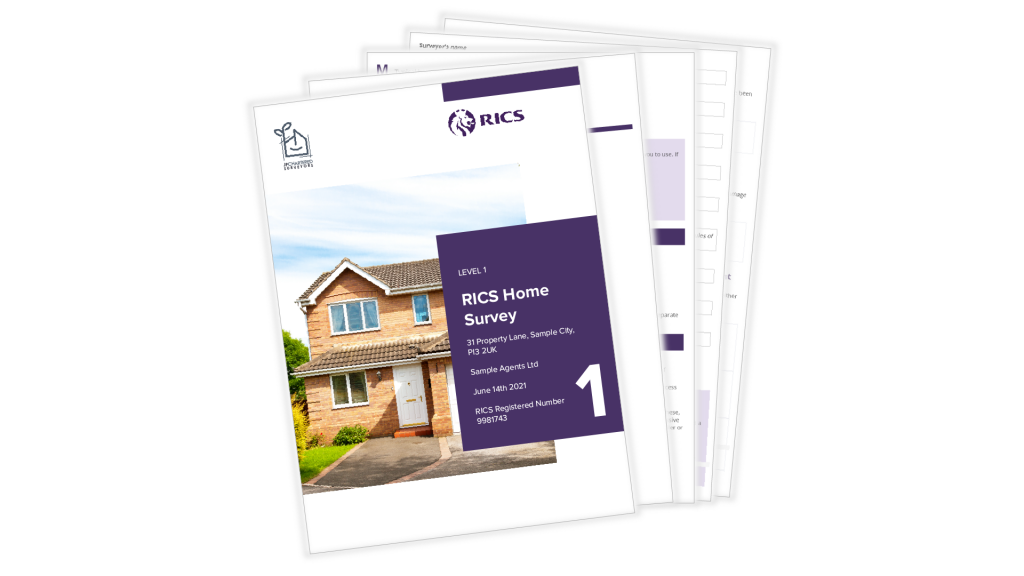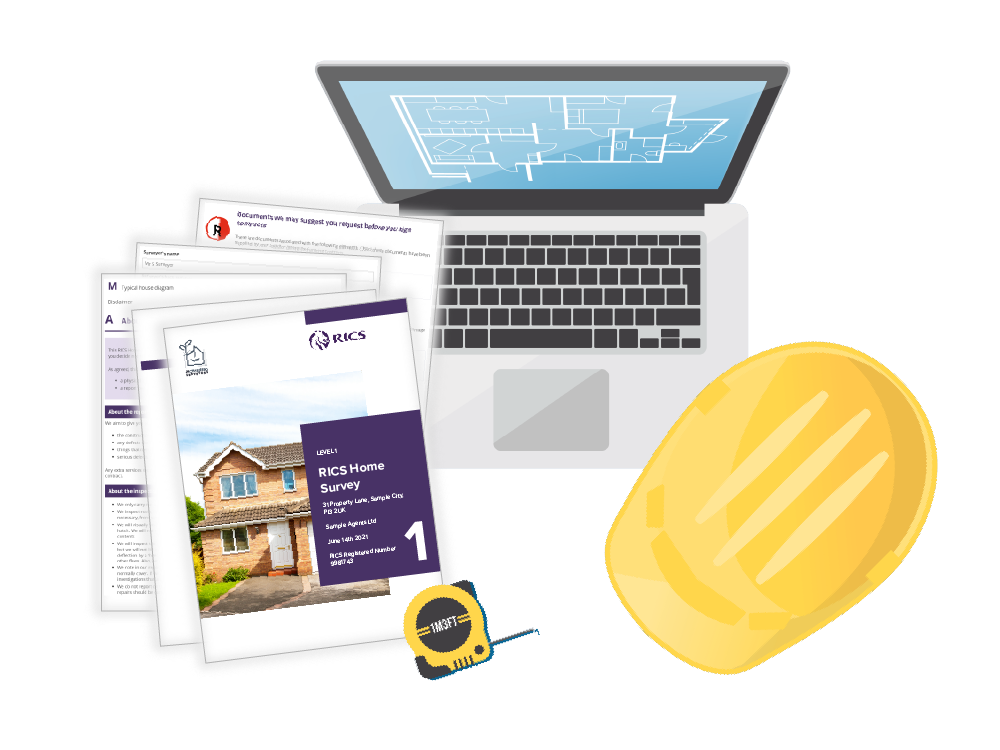The Royal Institution of Chartered Surveyors (RICS) was created in 1868, receiving a royal charter in 1881 that requires RICS to “promote the usefulness of the profession for the public advantage in the UK and in other parts of the world.”
Today RICS is known globally with over 134,000 qualified and trainee professional surveyors operating within the building, construction, land and real estate sectors and includes services for valuation and dispute resolution across, the land, property and built environments.
In April 2019, RICS conducted a review of existing guidance in order to standardise survey reports and processes culminating in the launch of RICS Home Survey Standard and report templates.
What is a RICS Home Survey?

RICS Home Surveys cover 4 key reporting requirements:
RICS Home Survey – Level 1
This report is for those buying or selling a conventional house, flat or bungalow built from common building materials and in reasonable condition. The service features include:
- Description of the properties construction and condition
- Aims to identify and inform of any serious or urgent problems that may need attention
- Identifies issues that require further investigation to prevent damage
- Looks to identify potential issues and defects before the property is purchased
Home Survey Report – Level 2 (survey only)
This report provides more extensive information whilst buying or selling a conventional house, flat or bungalow, built from common building materials and in reasonable condition that focuses on assessing the general condition of the main elements of a property. The service features include:
- All the features of a Home Survey Level 1
- Aims to help potential buyers to decide whether they will need extra advice before committing to the purchase of the property
- Provide an understanding of any potential issues or defects to enable the purchaser to budget and prioritise for any repairs or restoration including any on going maintenance that may be required
For a more detailed description of the RICS Home Survey Level 2 (survey only) document visit: www.rics.org – Level 2
Home Survey Report – Level 2 (survey and valuation)
This report includes all the elements of Home Survey Level 2 and the surveyors professional opinion in regards to reinstatement costs of the property and a market valuation.
For a more detailed description of the RICS Home Survey Level 2 (survey and valuation) document visit: www.rics.org – Level 2 + Valuation
Home Survey Report – Level 3
Potential buyers are likely to choose this report for a large, older or run-down property, a building that is unusual or altered, or if major works are planned. Although costs for a Level 3 survey are considerably higher; they provide detailed information about the structure and fabric of the property. The service includes:
- All the features of a Home Survey Level 2 (survey only)
- Aims to establish the how the property was built; the construction including material used and future performance
- Describes visible defects as well as exposing potential problems posed by hidden defects
For a more detailed description of the RICS Home Survey Level 3 document visit: www.rics.org – Level 3

Do I need a RICS home survey?
While it’s not mandatory to have a survey completed before purchasing a property, a thorough report conducted by a qualified surveyor can save you thousands during the buying process. You also risk taking on a property with serious structural issues that would have otherwise been identified before the purchase was complete.
AMany buyers use the outcomes of a survey to negotiate on price or give them a clear understanding of the amount of work that a property will need to be fit to live in. Ensuring you have a comprehensive and reliable report can make the difference between a happy purchase or an expensive headache.
How much does a RICS survey cost?
The cost of a survey will depend on the level you need, as well as the size and location of your property. For a property valued between £200,000 and £300,000 the average cost is £380. For a Home Survey Level 3; the cost i very much dependent on both the type and size of the property and the surveyor you choose to instruct to carry out the survey but should expect to pay upwards of £600 – £1,500 although this is only an estimate..
How do I find a RICS surveyor?
Estate agents will often work with a number of local, knowledgeable surveyors but you can also access their services by using the RICS Find a Surveyor service.
What does a RICS survey cover?
RICS surveys are used to assess the condition of a property and make suggestions on improvements and repairs that might need to be made. If your survey provides an estimate of the value of the property, this may not always be in line with a mortgage valuation carried out by your lender.
A mortgage valuation is a more straightforward assessment of your property in relation to the current property market and can even be done without visiting the property.
How long does a RICS survey take?
The time the survey will take varies depending on the level of report you’ve paid for. A Home Survey Level 1 or 2 (survey only) typically takes 1 -2 hours on site, while the Level 2 + Valuation and certainly the Level 3 reports will take considerably longer so the time will vary according to both the layout of the property as well as the age, condition and the amount of potential problems or defects found.
How long does a RICS survey last for?
There is no fixed expiry date for survey reports however the property price (or valuation) Home Survey Level 2 (survey + valuation) report is only valid for 3 months (90 days).
The UK market is experiencing huge increases in property prices but as they are likely to fluctuate as we move beyond the tapering off the stamp duty, therefore a valuation can only be relied on for a short period of time.
Connect with surveyors before you buy
Property Inspect works with estate agents, property managers and surveyors to connect property professionals in every discipline and ensure that every property is assessed to the highest standards. This ensures your investment is protected whether you’re a new buyer, an independent property owner or a property management company.

